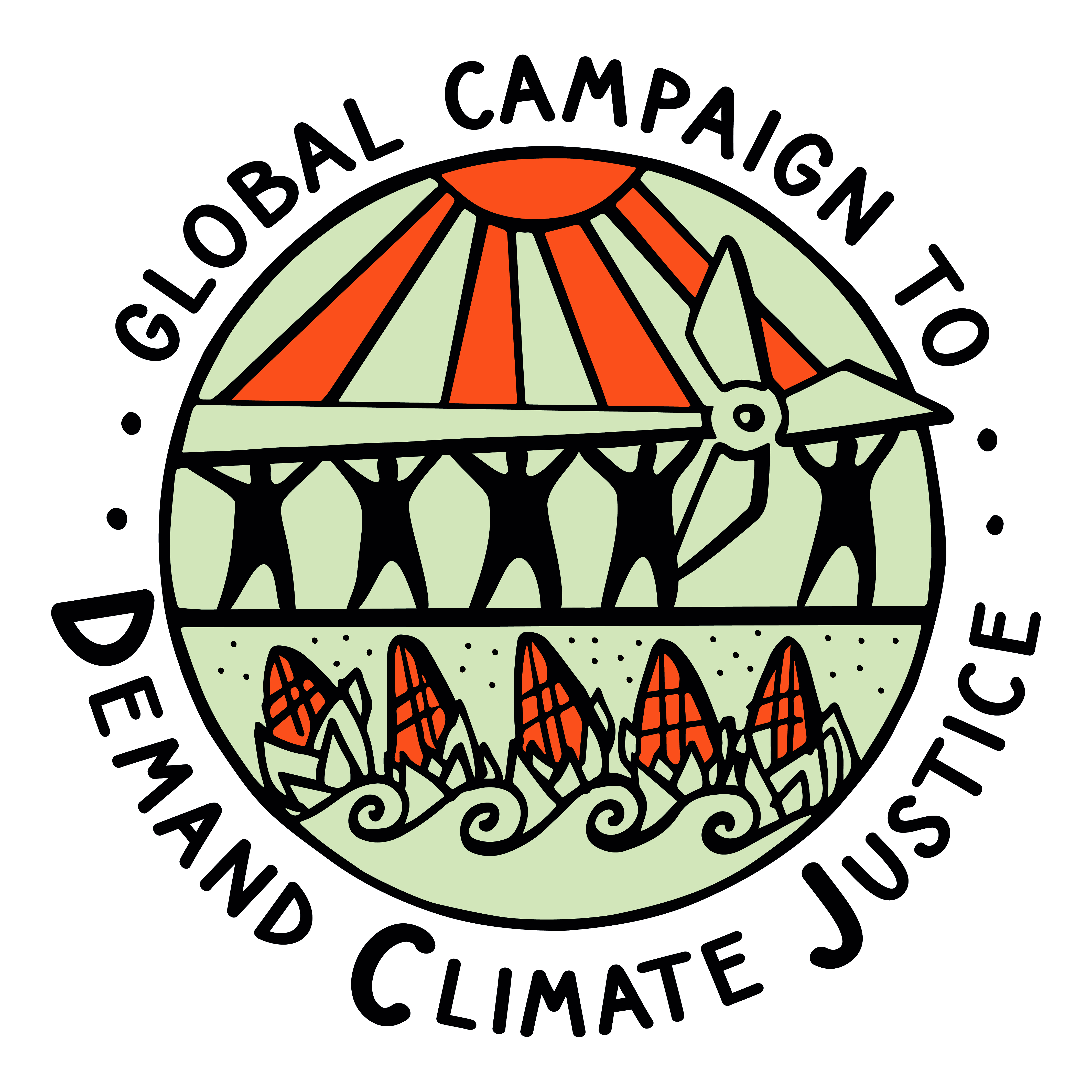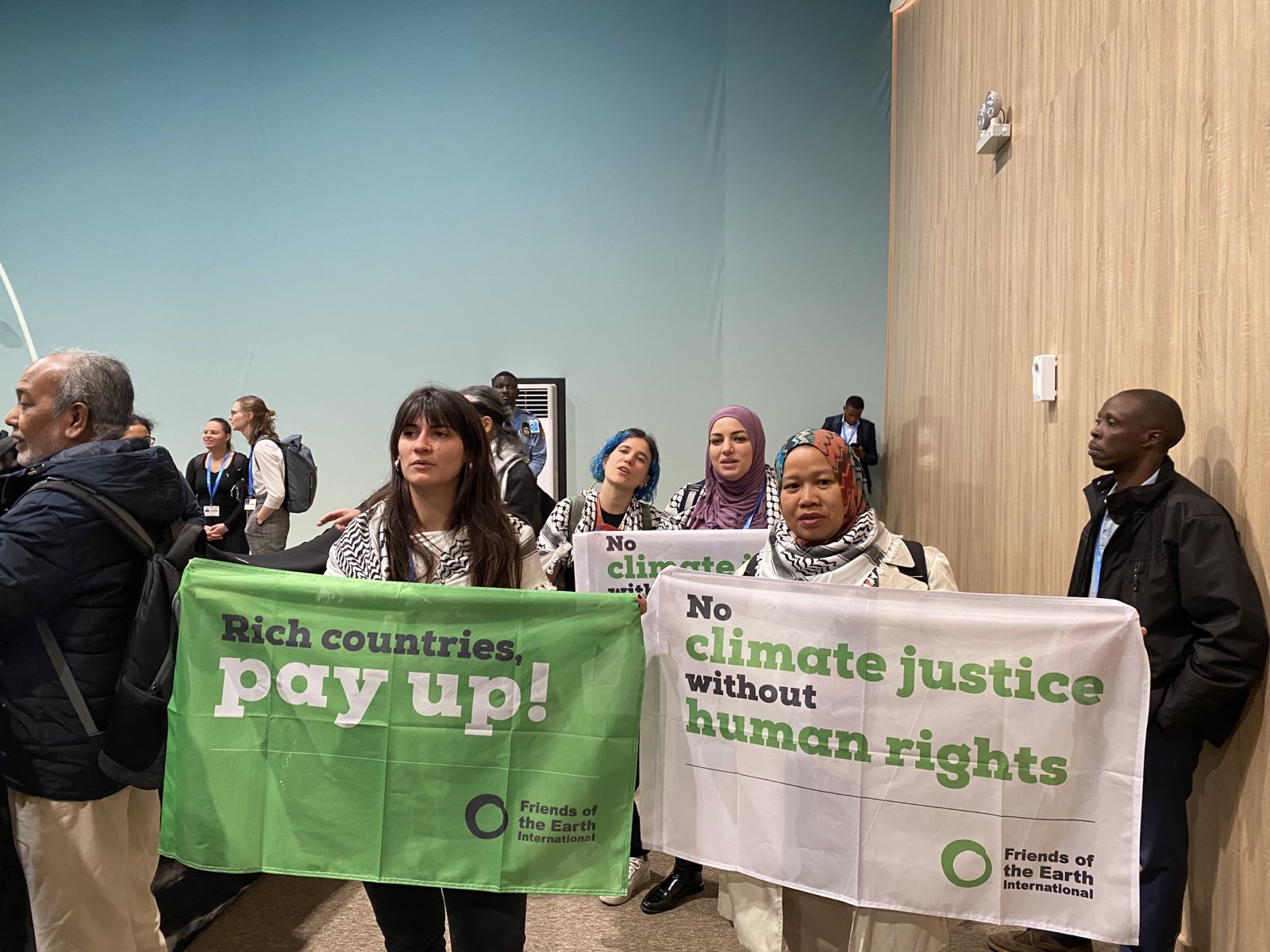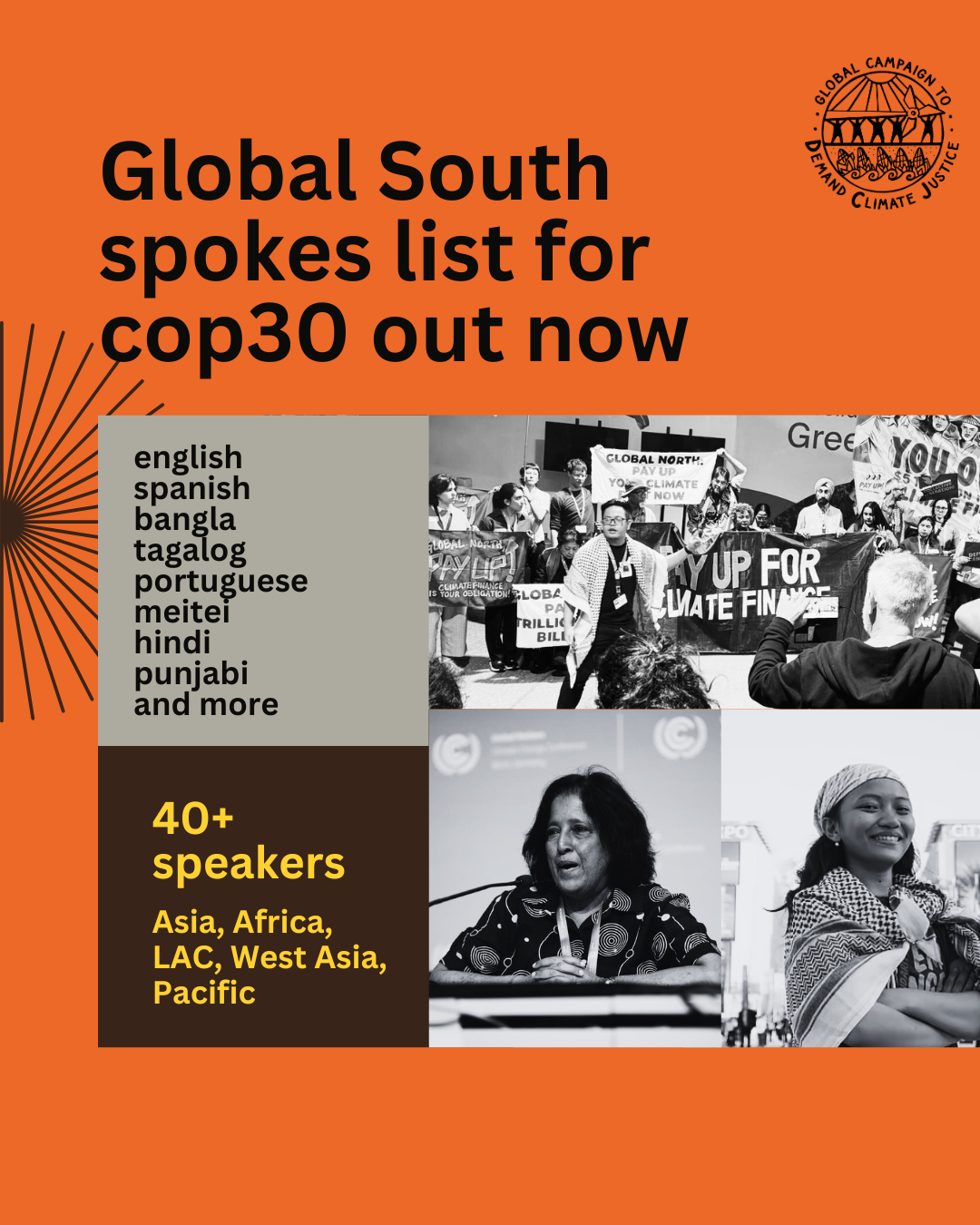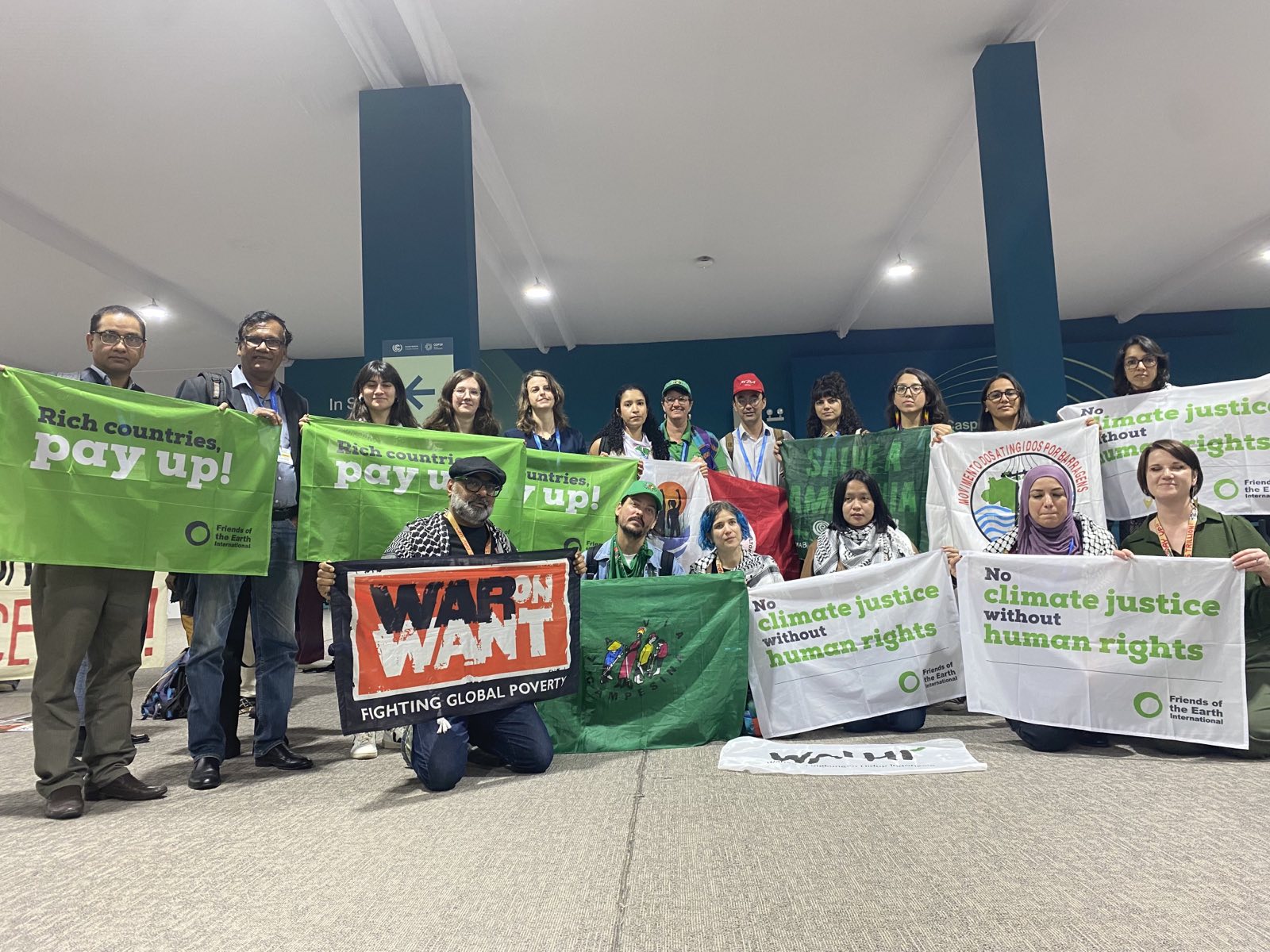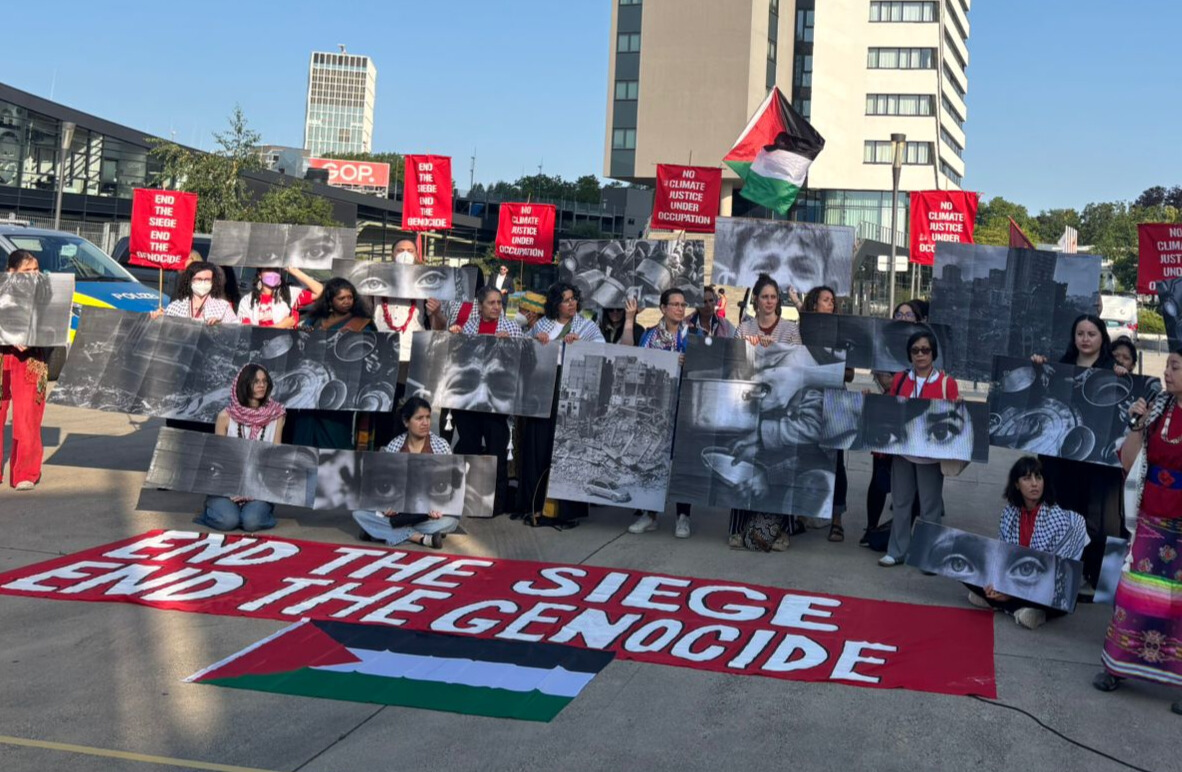COP30 delivers limited but crucial wins despite the Global North Obstruction and Finance Evasion
Summary
COP30 delivered a handful of necessary and hard-won advances through sustained pressure from communities and movements on the frontline of the crisis as throughout the talks, the Global North, particularly the EU and the UK, deployed delay tactics, blocked progress, threatened walk-outs, and worked aggressively to shift responsibility onto Global South countries.
Civil society notes hard-fought gains on Just Transition at COP30 in the face of Global North’s obstruction and push for false solutions. The call for real climate finance grows louder!

Reactions from members of the Global Campaign to Demand Climate Justice (DCJ)
22nd November 2025
Belem, Brazil
COP30 delivered a handful of necessary and hard-won advances through sustained pressure from communities and movements on the frontline of the crisis as throughout the talks, the Global North, particularly the EU and the UK, deployed delay tactics, blocked progress, threatened walk-outs, and worked aggressively to shift responsibility onto Global South countries.
One such advance is the establishment of a Just Transition Mechanism inside the UNFCCC that offers hope for a plan that will be just, equitable and ecological, leaving no one behind. This comes after decades of organising by Indigenous Peoples, workers, women, youth, peasants, fisherfolk, and frontline communities. The mechanism finally recognises inclusion of workers affected by transitions, including informal labour, people in vulnerable situations, Indigenous Peoples, farmers, peasants, fisherfolk, local communities, migrants and internally displaced persons, people of African descent, women, children, youth, elderly people, and persons with disabilities, to enable effective, inclusive, and participatory just transition pathways. But the fight is only just beginning and its real potential will depend entirely on its operationalising which must be grounded in equity and CBDR-RC, ensure formal participation of civil society and rights-holders, and resist the corporate capture and false solutions that have repeatedly undermined climate justice. Without this, the mechanism risks becoming symbolic rather than transformational.
The mutirão also delivered crucial steps on Global North financial obligations and options to discuss trade and climate linkages, which is a small but important step. COP30 finally saw creation of a formal space to examine implementation of Article 9.1 for the first time, the Paris Agreement’s legal requirement that developed countries shall provide climate finance to developing countries. This outcome was secured despite intense resistance from the rich countries who continue to inflate their finance claims, count loans as climate support, and push private finance instead of public, grant-based, non-debt creating finance to the Global South as per their obligations. Their attempts to dilute this new work programme by expanding it toward “mobilising private finance” reveal a broader effort to evade responsibility. Even though it is limited, this inclusion ensures a new tool for accountability of the Global North countries and exposes long-standing finance deception, where rich countries continue to spend trillions to advance their war campaigns and military operations instead of taxing the rich and ending fossil fuel subsidies. This deception was further reflected in the hollow commitment on tripling adaptation finance without any reference to base line when the real needs for adaptation and loss and damage finance is in trillions.
The Brazilian presidency’s resolve to advance Transitioning Away from Fossil Fuels through a roadmap is a welcome step, but fossil fuel phase out must be fast, fair, funded, equitable and without false solutions starting with the rich countries who created this crisis. Global North countries must sign Colombia’s Belém Declaration on transitioning away from fossil fuels and reflect their commitment to cut emissions through ambitious NDCs and stop any new fossil fuel expansion.
In this context, we also reject the increased push for all false solutions including the market-based and financialisation of land, forests, oceans and resources, especially TFFF (Tropical Forest Forever Facility), a rebranded carbon market scheme that allows polluters to continue polluting, distracting from the urgent need for public, grant-based climate finance and real emissions cuts.
COP30 outcome clearly shows the real direction of climate action comes from people-led, community-rooted solutions. We will continue to fight inside the UNFCCC, but it is the power of the peoples and movements that will deliver the transformation needed. Despite obstruction, false solutions, and political theatre by the Global North, the truth that stands clear is that the answers lie with the peoples and not with those who created this crisis.
Quotes
Meena Raman, Third World Network
The countries of the Global North, led by the EU and UK, effectively held the COP30 negotiations hostage—insisting on diluting commitments to climate finance for adaptation before allowing progress. Their public frustration over the supposed lack of ambition on mitigation was little more than posturing, designed to deflect attention from their own obligations.
Meanwhile, the scale of adaptation needs in the global South runs into the billions, as climate impacts intensify and fall hardest on the poorest and most vulnerable communities—those least responsible for the crisis, yet most affected by the historical emissions of developed nations.
Instead of rising to the moment and scaling up grant-based finance for adaptation and for loss and damage, these countries continue to play political games. The result is devastating: millions of already vulnerable people who are being pushed closer to the brink, their futures eroded by inaction and broken promises.
Lidy Nacpil, Asian Peoples’ Movement on Debt and Development:
The EU led circus over the Roadmap for transitioning away from fossil fuels was nothing more than a negotiating ploy to water down proposed text they did not like – foremost of which was on Adaptation Finance. A serious proposal for a Roadmap should be grounded in the principle of equity based on historical and differentiated responsibility, and ensure the inclusion of clear targets and timelines, corresponding commitments for climate finance delivery, and a comprehensive just transition program. The people of the South have the greatest stake in a rapid, just and equitable transition out of fossil fuels, directly to democratic renewable energy systems, with no false solutions. We welcome the decision on Just Transition, a product of hard work and campaigning by movements and civil society and an important step forward.
Pema Lhundrup, Earth in Brackets, said:
At the COP of Truth we witnessed many lies. The lies of action in these inaccessible halls. The lies of the global north championing the climate. The lies of climate finance as they weaken language refusing to pay up. All without acknowledging colonialism, imperialism and capitalism as the true root causes of climate collapse.
While BAM, a cross constituency effort is reflected in the Just Transition Mechanism it means nothing without adaptation finance. Tripling finance from 2025 means nothing if there was no finance to triple! Earth in Brackets represents the youth as a part of the environmental movement and incremental progress, while progress is not enough.
We have seen the closed doors and black box “diplomacy” shutting out observers. We have seen the manipulation of the media and the greenwashing of this just transition. We have seen the failure of UNFCCC doing too little too late. We need reform and we need action and when we succeed, we will let them know that it wasn’t because of these hallways.
It was the youth, the women, the indigenous peoples, the afro-descendents and the periphery that brought systematic change and climate justice. From the mangroves to the mountains.
Adrián Martínez Blanco, La Ruta del Clima
The third pillar of climate action called the Inter-American Human Rights Court to Repairing Loss and Damage. However, COP30 was empty of decisions to transform existing mechanisms to repair loss and damage. A penny less fund and the denial of obligations to repair remain a key part of the climate regime architecture. Communities around the world demand access to justice and the end of profiteering, it’s time for States to live up to their obligations and repair the harm. Neither rights nor legal duties should be on the negotiation’s menu, the UNFCCC must align with the law.
Ogunlade Olamide Martins, Corporate Accountability and Public Participation Africa (CAPPA), Nigeria:
COP30 has once again exposed the widening gulf between diplomatic theatre and the lived realities of frontline communities in the Global South. The process remains captured by the same interests driving the climate crisis, prioritising false, market-driven ‘solutions’ over real justice, real finance, and real emissions cuts. In its outcomes and its posture, COP30 continues to reward polluters while sidelining Indigenous peoples, workers, farmers and communities already paying the highest price for a crisis they did not create.
Janaina Uemura, Global Forest Coalition, Brazil
Different COP, same old story. The UNFCCC needs to be fundamentally reformed for it to retain even an illusion of legitimacy. There is no way that this process is even capable of ending deforestation, much less steering the world away from catastrophic climate change, equitably or otherwise. The corporate lobbyists must be kicked out immediately, and big polluters face up to their moral responsibilities now.
Rachitaa Gupta, Global Campaign to Demand Climate Justice
Thirty-three years after the UNFCCC was born here in Brazil, we return to a COP where the rich countries came determined to block finance, weaken equity, silence frontline voices, and turn the UNFCCC into a playground of their manipulative games and hypocritical grandstanding. Despite their delay tactics and threats, peoples’ power forced open political space through advances on a Just Transition mechanism and a formal process to scrutinise Article 9.1 finance obligations of the Global North. But these gains will mean nothing unless the EU, UK, and broader Global North finally deliver public, grant-based climate finance at the scale of trillions. We reject the continued attempts to repackage false solutions like TFFF that financialise nature, undermine rights, and allow polluters to keep polluting instead of phasing out fossil fuels. COP30 showed that while governments stalled, the Peoples’ Summit showed the path forward. Our message is simple: the answer is us. We will keep fighting for real climate finance, a just, equitable, feminist and funded transition, and a fast, fair, funded, fossil fuel phase-out led by the Global North, because climate justice is not a favour to be granted, but a right our peoples will claim.
Andrea Echeverri, Global forest coalition, Colombia
La organización popular alrededor de esta COP ha mostrado cómo la diversidad de los pueblos insiste en soluciones y camina la esperanza, que en la Zona Azul son deliberadamente restringidas. Queremos resaltar que otro futuro es posible, pero no sin nosotrxs. Ninguna decisión más sobre nosotrxs sin nosotrxs. Fuera los grandes contaminadores, Fuera el agronegocio, Fuera los Combustibles Fósiles, y todas sus narrativas. Un futuro es posible si articulamos nuestras luchas contra todos los grandes contaminadores y sus falsas soluciones.
Leon Sealey-Huggins, War on Want
COP30 has agreed on a Global Just Transition Mechanism — the Belém Action Mechanism (BAM). We won this because our movements forced a shift from the Global North’s initial refusal to back any new institutional arrangements. Even the UK government moved under huge pressure: in just seven hours, over 40 youth groups and 100 UK organisations and unions backed our calls for the BAM.
This mechanism is not the end of the struggle, but it is a vital victory that anchors our fights for justice within the UN. The wider COP30 outcome still falls short: Global North governments lack ambition on adaptation and loss and damage finance, and continue to drag their feet on fossil fuel phase-out while expanding extraction. Their touted ‘roadmap’ was rightly rejected — a map with no street names and no vehicle. That vehicle is Northern ambition and finance. But BAM shows the power of grassroots and frontline leadership.
Asad Rehman, chief executive of Friends of the Earth England, Wales and Northern Ireland
After two weeks of fraught negotiations, rich countries had to be dragged to the table kicking and screaming to reach the outcome we have today. They tried to bully developing countries into accepting crumbs and the weakening of language in the text to serve their interests. But for once, we can at least say we have taken a small step forward. This will be welcomed by the millions for whom these talks are life or death. However, the scale of the crisis we face requires giant leaps forward.
This eleventh hour deal finally puts forward two of the key outcomes the countries on the front lines of climate breakdown have long been demanding – a meaningful pathway to a fair and just transition and real finance to help them adapt to the escalating effects of climate breakdown.
While the tripling of cash for adaptation is only the tip of the iceberg of what’s needed, it’s a start and signals that rich countries are being forced to recognise how critical this is to global cooperation on climate.
Over the last 48 hours, there has been unprecedented and targeted pressure from thousands of people, including many of our supporters in the UK, who have been calling on governments like ours to stop holding the talks hostage. This is how we were able to move them to back the call for a transition that leaves no one behind. The new Just Transition mechanism is the stepping stone to a greener future rooted in fairness and dignity for all. Of course, there is still much to be desired in the final outcome. Promises of doubling and tripling debt-creating loans will offer little hope to those whose economies are being devastated by killer floods and droughts. If we can stop the UK and other rich countries blocking plans to tax big business and the wealthy elites, we can shore up the funds needed to tackle both the climate and inequality crisis.
Kirtana Chandrasekaran, Friends of the Earth International
Once again negotiations were down to the wire with rich countries blocking genuine progress on finance and just transitions. They are playing fast and loose with people’s lives. There can be no fossil fuel transition without trillions in climate finance, equity and deep transformation of our economies and society. At the Peoples’ Summit thousands of social movements created a path away from environmental disaster, economic instability and the rise of the far right. Our unity is our beacon of hope.
Rachel Rose Jackson, Corporate Accountability:
Only a couple days ago, the halls of climate action were literally up in flames. This feels like a scary manifestation of the reality outside of these climate talks. Though there has been some shifting of the dial thanks to the sustained campaigning of movements, we cannot proclaim any COP a victory if it delivers baby steps on paper that still equate to leaps and bounds backwards on the ground. With a climate crisis that is burning down peoples’ doors and drowning entire communities— especially those on the frontlines— the pace of action must match that of a world champion sprinter, not a slug. Yet again the EU and others, as the largest historical polluters, continue to orchestrate their great escape. The US, who told the world it wouldn’t even bother to show up, is still manipulating on the sidelines in Belém while it expands oil and gas drilling at home. And Big Polluters continue to write the rules of climate action with no protections in place. We must reset the system– Kick Big Polluters Out, demand the Global North do its fair share and pay its climate debt, and urgently and justly end the fossil fuel era that is poisoning us. These are the only measures by which a true success can be measured.
Romain Ioualalen, Global Policy lead at Oil Change International
The rich polluting countries that caused this crisis have blocked the breakthrough that we need. Amidst this flawed outcome, there are glimmers of real progress. The Belém Action Mechanism is a major win made possible by movements and Global South countries that puts people’s needs and rights at the center of climate action. The EU, UK, Australia and other wealthy nations are to blame for COP’s failure to adopt a roadmap on fossil fuels by refusing to commit to phase out first or put any public money on the table for the crisis they have caused. We didn’t win the full justice outcome we need in Belém, but we have new arenas to keep fighting. We look forward to Colombia’s first international conference on fossil fuel phase out to rally more countries behind this push that science, equity, and international law demand.”
Jax Bongon, IBON International:
COP30 adds yet another chapter to the long history of climate talks captured by corporate interests. What was supposed to be the ‘COP of Truth’ was overwhelmed with lies and false ‘solutions’ designed to protect the same rich and powerful actors who pushed the world into this crisis. Meanwhile, real solutions that can strengthen communities’ adaptive capacity, restore ecosystems, and drive a Just Transition continue to fall on deaf ears. It is infuriating to watch governments speak of ‘transition’ while clinging to the extractive logic that created the crisis in the first place. This moment demanded reckoning and real transformation because we simply have no time left for delays. And once again, COP30 failed to rise to that moment.
Daniela Mendoza, Censat Agua Viva / Friends of the Earth Colombia
Any debate on the energy transition has to be framed within the context of justice and reparation for the territories and peoples affected by extractivism. There’s no just transition without recognition of the ecological debt owed by countries in the Global North. We need public climate finance derived from the debt owed to countries of the Global South, but instead the Global North is busy spending billions to finance war and genocide.
Adrien Salazar, Grassroots Global Justice Alliance
This COP has yet again delivered incrementalism where science and justice demand a rapid, equitable, and just transition away from an economy driven by fossil fuel extraction and exploitation of people. Last week thousands participated in the independent, social movement-organized People’s Summit, producing a declaration that stated in no unclear terms that we must end the crises of climate chaos, economic instability, and escalating fascism, wars, and genocide suffering our peoples. That demands a wholesale transformation of economies away from the profiteering of the few towards an economy in the hands of the people. This COP was indeed historic in its level of unnecessary militarized response to Indigenous peoples and activists exercising their right to protest. Militarization does not keep our communities safe, it only cultivates violence, trauma, and ecological destruction. There can be no climate justice without demilitarization.
Fernando Tormos-Aponte, Just Transition Alliance
The COP30 decision to create a just transition mechanism both responds to the demands of many Indigenous Peoples, frontline workers, and the most impacted communities, while lacking the processes, principles, and fundamental components necessary for ensuring a just transition. The context in which the Just Transition Work Programme negotiations have taken place does not align with just transition principles. At this year’s COP, we have witnessed an unacceptable, record-breaking number of fossil fuel and false solutions lobbyists, including advocates of carbon capture and storage and carbon markets. The fight for a just transition did not start at this COP, and it will not end in Belém. There can be no just transition without the most affected groups deciding pathways forward, based on their needs, indispensable knowledges, and visions for systems change. Only with these groups’ central involvement in decision making will the just transition mechanism be fully realized.
David Williams, Head of International Climate Justice Program, Rosa-Luxemburg-Stiftung
While the city of Belém delivered, rich countries did not. It was deeply disappointing to see that a roadmap for transitioning away from fossil fuels could not be reached, largely because rich countries once again refused to put real finance on the table for implementation. Their unwillingness to support the very transitions they publicly champion exposes a profound lack of political will and continues to place the burden of the climate crisis on those least responsible for it.
There was meaningful progress made on just transition, particularly the references to equity, human and labor rights. However, the abdication of responsibility extended to adaptation finance, where rich countries once again refused to acknowledge or act on their historical role in driving the climate crisis. Their continued obstruction is not just a policy failure but a moral one, leaving vulnerable communities to shoulder the consequences of decades of emissions they did not cause.
Brandon Wu, Director of Policy and Campaigns at ActionAid USA, said:
The adoption of a strong text on just transition at COP30 is a cause for celebration, but it’s tempered by the fact that rich developed countries have continued fighting against any meaningful pledges to do their fair share. They watered down a commitment to triple adaptation finance – which is absolutely crucial for the survival of many frontline communities in the Global South – by removing the baseline and pushing the deadline to 2035. Ten years from now is an unimaginably long time for communities facing life-threatening impacts now. Unless developed countries are pressed hard, this decision does little but lock in climate injustice for the foreseeable future.
The just transition outcome, on the other hand, is a win for civil society, which has long pushed for it. This decision develops a mechanism for supporting countries to create and implement just transition plans – in the energy, agriculture and other sectors – that will reduce emissions while protecting communities, workers and ordinary people. But as we’ve seen, rich developed countries will bend over backwards to avoid their obligations on climate finance. For the just transition mechanism to live up to its potential as a real game-changer, and for the world to have a chance at averting the worst of the climate crisis, rich countries have to step up.
Elodie Guillon, Head of Civil Society and Engagement, World Animal Protection, said:
The ‘COP of truth’ turned its back on the climate destruction and suffering caused by industrial animal agriculture. Small-scale farmers are rightly given an important role in the just transition, but it’s concerning there is no mention of animal welfare, considering the health of animals and our environment are so deeply connected. Big agribusiness won at COP30, while wildlife and farmed animals were reduced to commodities and excluded from any climate action. For a COP hosted in the Amazon, it’s devastating that deforestation took a back seat. Wildlife, indigenous people and traditional communities who call the forest home deserved far better. The UNFCCC must act decisively to curb the influence of ‘big ag’ and tackle emissions from food systems if it hopes to salvage credibility ahead of COP31 in Türkiye.
Jean Su, Center for Biological Diversity’s Energy Justice Director
It’s a big win to have the Belem Action Mechanism established with the strongest-ever COP language around Indigenous and worker rights and biodiversity protection. The BAM agreement is in stark contrast to this COP’s total flameout on implementing a funded and fair fossil fuel phaseout. Even without the Trump administration there to bully and cajole, petrostates again shut down meaningful progress on a roadmap to phase out fossil fuels with necessary funding for poorer countries. It’s critical that countries lock down some meaningful, funded game plan for a fossil fuel phaseout. In just a few years, we expect the U.S. to be back in these talks. We should have an agreement that binds the U.S. to provide funding and technology to poor countries in line with its role as the largest historical emitter.
Friederike Strub, Climate Finance Campaigner, Recourse, said:
The decision to develop a just transition mechanism is a crucial win for workers and communities and shows the power of civil society organising. But to make the just transition happen we need public finance backing, systemic economic reform, and a clear roadmap to end fossil fuels. Rich countries at COP30 have done everything in their power to dilute their financial obligations, refuse to pay their climate debts, and undermine the necessary deep structural changes to a climate and development finance architecture that has thus far failed to deliver justice. Global South countries cannot act on climate within a system of debt, tax and trade governance that is stacked against them and traps them in cycles of debt, dependency, austerity and extractivism. In response, rich countries have been peddling false finance solutions – from debt swaps to private finance for adaptation – and pushing unaccountable, undemocratic international financial institutions to the centre. Multilateral development banks’ failed “billions to trillions” agenda and community-bulldozing “green” infrastructure projects, together with the IMF forcing debt-burdened countries into climate denying pathways and greenwashed austerity, will not deliver a just transition. We need rights-based, gender-responsive, people-centred climate and development action, and a global finance architecture that enables this.
